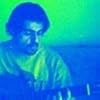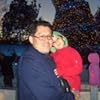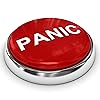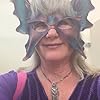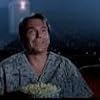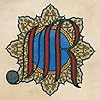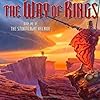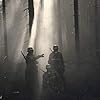To answer questions about
Dune,
please sign up.
Nasos Delveroudis
- (warning, wall of text incoming)
Short answer: No, it's not necessary to read the rest of the series. Dune can be treated as a standalone book and story.
But why would you want to do that? You'll miss most of the fun, as some of the subsequent books are arguably better (especially God Emperor of Dune which, in my opinion, is probably the best and deepest sci-fi work of all time by far). Moreover the saga of Dune by no means ends with that #1 book, as only in the second volume there are huge plot twists and the story develops drastically taking a whole new turn (quite unexpected too).
Long answer: The Dune saga practically consists of two parts. The first six books were written by Frank Herbert in the period between 1965 and 1985. These are::
1) Dune (1965)
2) Dune Messiah (1969)
3) Children of Dune (1976)
4) God Emperor of Dune (1981) (like I said, arguably the best book of its genre)
5) Heretics of Dune (1984)
6) Chapterhouse: Dune (1985)
One may read them in this exact order, as they're not only sorted by publishing date but it's also how the epic unfolds in chronological order. Unfortunately Frank left his work unfinished and the story incomplete, because he passed away before he had the chance to finish the seventh book.
But his legacy lived on and it was his son Brian Herbert who resumed the Dune series, in collaboration with Kevin Anderson (widely known for contributing to the Star Wars universe by writing lots of original stories, especially "The Jedi Academy Trilogy").
Not only that but just after they'd started writing the first few books of the "modern" Dune era, they discovered long lost and forgotten material by late Frank, sealed for 15 odd years in a bank locker. It turned out these notes were actually rough guidelines about the legendary Dune 7, the missing part of the saga, the one which would complete the series, which no one had expected to see.
Brian and Kevin have released 12 books so far (but we should be expecting more to come), which I'll cite below. They are separated by thematic context, which is required as most have been written in trilogy form and need to be read in this particular order:
--- Prelude to Dune series (it's about a period beginning about 35 years before the events of the original Dune and ending about 15 years before them):
1. House Atreides (1999)
2. House Harkonnen (2000)
3. House Corrino (2001)
--- Legends of Dune series (refers to the old galaxy-wide war between humankind and machines, about 10 thousand years before Dune, when the foundations of the saga were actually built):
4. The Butlerian Jihad (2002)
5. The Machine Crusade (2003)
6. The Battle of Corrin (2004)
- Dune 7 (as a matter of fact it's an untitled series but it's practically Dune 7, split in two parts and it obviously resumes the story from where Frank Herbert left it in distant 1985):
7. Hunters of Dune (2006)
8. Sandworms of Dune (2007)
--- Heroes of Dune series (it's about a period starting around 15 years before Dune until its very beginning):
9. Paul of Dune (2008)
10. The Winds of Dune (2009)
--- Great Schools of Dune series (OK, I'll have to admit I haven't read these two yet, so I haven't got the slightest idea what they're about! Hopefully I'll find out soon enough)
11. Sisterhood of Dune (2012)
12. Mentats of Dune (2014)
The emerging question is in which order does one have to read all these books (the usual and everlasting dilemma of non-linear/multi-volume series such as the Lord of the Rings/Hobbit/Silmarillion, Ender's Saga etc). Do we have to follow the order in which they were written/published or the chronological order in which the story develops? Do we need to first read Dune (1965) or perhaps go with the Butlerian Jihad (2002) which, after all, takes place 10 thousand years earlier?
My suggestion is to read them exactly in the order in which they were presented above. I think it'd be a sin (really) if your first impression about Dune were from the books of Brian Herbert and not from Frank's.
One could also ponder if all these books are really worth it, all 18 of them. Perhaps some might actually be skipped altogether? I'd say the first twelve of them (from Dune-1965 to The Battle of Corrin-2004) are really a must read. Obviously the first six books (by Frank) are MUCH deeper but if you could make some concessions, Brian's volumes are pretty good themselves. You only need to not expect the same level of depth and lower your requirements. They'll turn out to be pretty enjoyable.
However I believe that beginning from Hunters of Dune, the story takes a somewhat Star Wars-ish turn and deviates from Frank's original spirit (eg. instead of the usual layered plots within plots within plots with increasingly difficult to grasp notions, you're starting to read more and more about space fights and lasers and the like).
All in all, I hope you'll enjoy the Dune Chronicles!
Short answer: No, it's not necessary to read the rest of the series. Dune can be treated as a standalone book and story.
But why would you want to do that? You'll miss most of the fun, as some of the subsequent books are arguably better (especially God Emperor of Dune which, in my opinion, is probably the best and deepest sci-fi work of all time by far). Moreover the saga of Dune by no means ends with that #1 book, as only in the second volume there are huge plot twists and the story develops drastically taking a whole new turn (quite unexpected too).
Long answer: The Dune saga practically consists of two parts. The first six books were written by Frank Herbert in the period between 1965 and 1985. These are::
1) Dune (1965)
2) Dune Messiah (1969)
3) Children of Dune (1976)
4) God Emperor of Dune (1981) (like I said, arguably the best book of its genre)
5) Heretics of Dune (1984)
6) Chapterhouse: Dune (1985)
One may read them in this exact order, as they're not only sorted by publishing date but it's also how the epic unfolds in chronological order. Unfortunately Frank left his work unfinished and the story incomplete, because he passed away before he had the chance to finish the seventh book.
But his legacy lived on and it was his son Brian Herbert who resumed the Dune series, in collaboration with Kevin Anderson (widely known for contributing to the Star Wars universe by writing lots of original stories, especially "The Jedi Academy Trilogy").
Not only that but just after they'd started writing the first few books of the "modern" Dune era, they discovered long lost and forgotten material by late Frank, sealed for 15 odd years in a bank locker. It turned out these notes were actually rough guidelines about the legendary Dune 7, the missing part of the saga, the one which would complete the series, which no one had expected to see.
Brian and Kevin have released 12 books so far (but we should be expecting more to come), which I'll cite below. They are separated by thematic context, which is required as most have been written in trilogy form and need to be read in this particular order:
--- Prelude to Dune series (it's about a period beginning about 35 years before the events of the original Dune and ending about 15 years before them):
1. House Atreides (1999)
2. House Harkonnen (2000)
3. House Corrino (2001)
--- Legends of Dune series (refers to the old galaxy-wide war between humankind and machines, about 10 thousand years before Dune, when the foundations of the saga were actually built):
4. The Butlerian Jihad (2002)
5. The Machine Crusade (2003)
6. The Battle of Corrin (2004)
- Dune 7 (as a matter of fact it's an untitled series but it's practically Dune 7, split in two parts and it obviously resumes the story from where Frank Herbert left it in distant 1985):
7. Hunters of Dune (2006)
8. Sandworms of Dune (2007)
--- Heroes of Dune series (it's about a period starting around 15 years before Dune until its very beginning):
9. Paul of Dune (2008)
10. The Winds of Dune (2009)
--- Great Schools of Dune series (OK, I'll have to admit I haven't read these two yet, so I haven't got the slightest idea what they're about! Hopefully I'll find out soon enough)
11. Sisterhood of Dune (2012)
12. Mentats of Dune (2014)
The emerging question is in which order does one have to read all these books (the usual and everlasting dilemma of non-linear/multi-volume series such as the Lord of the Rings/Hobbit/Silmarillion, Ender's Saga etc). Do we have to follow the order in which they were written/published or the chronological order in which the story develops? Do we need to first read Dune (1965) or perhaps go with the Butlerian Jihad (2002) which, after all, takes place 10 thousand years earlier?
My suggestion is to read them exactly in the order in which they were presented above. I think it'd be a sin (really) if your first impression about Dune were from the books of Brian Herbert and not from Frank's.
One could also ponder if all these books are really worth it, all 18 of them. Perhaps some might actually be skipped altogether? I'd say the first twelve of them (from Dune-1965 to The Battle of Corrin-2004) are really a must read. Obviously the first six books (by Frank) are MUCH deeper but if you could make some concessions, Brian's volumes are pretty good themselves. You only need to not expect the same level of depth and lower your requirements. They'll turn out to be pretty enjoyable.
However I believe that beginning from Hunters of Dune, the story takes a somewhat Star Wars-ish turn and deviates from Frank's original spirit (eg. instead of the usual layered plots within plots within plots with increasingly difficult to grasp notions, you're starting to read more and more about space fights and lasers and the like).
All in all, I hope you'll enjoy the Dune Chronicles!
Rafael P
Dune stands alone, you do not need to read anything else
Andrew Cleary
The first book was written as an open-ended standalone novel. After its success. Herbert planned out an eight-part dune series and began working on book two. However, after writing book six he unfortunately died. His son and a hired author finished the last few books a while ago. So there are really three "break points" in the series, after book one, after book six and after book eight. Some people would also say after book four as that's quite a dramatic shift in the scope of the Duniverse, but that's getting into spoiler territory.
Ray Palmer
Dune is a great book on its own and you don't need to read anything else.
If you like it, the story arc that begins with Dune continues in the following novels:
Dune Messiah
Children of Dune
God Emperor of Dune
Some are better than others, but these four are far better than any other Dune books out there.
Heretics of Dune begins a new story arc that continues in Chapterhouse: Dune. Herbert died before he could finish this story arc. It's not very good.
Herbert's son and some co-authors have mined his notes and are writing books under the Dune banner. These books don't have the style, tone, or quality of the original Dune.
If you like it, the story arc that begins with Dune continues in the following novels:
Dune Messiah
Children of Dune
God Emperor of Dune
Some are better than others, but these four are far better than any other Dune books out there.
Heretics of Dune begins a new story arc that continues in Chapterhouse: Dune. Herbert died before he could finish this story arc. It's not very good.
Herbert's son and some co-authors have mined his notes and are writing books under the Dune banner. These books don't have the style, tone, or quality of the original Dune.
William
The first book easily stands alone.
For me, when I read the original Dune at 17 years old, the story was magical, complex, powerful. I heard discouraging words about the sequels, or some of them. So I moved on to other authors and books.
For me, when I read the original Dune at 17 years old, the story was magical, complex, powerful. I heard discouraging words about the sequels, or some of them. So I moved on to other authors and books.
Suzanne Thackston
the rest of the series would be a little harder without a foundation but yes, the first one stands alone easily.
Charles
Personally, I thought the sequels were a let-down after the first. I stopped after the second sequel, so the later books may have been better.
Kevin
I would highly recommend that you read the entire Dune series by Frank Herbert. I would suggest you stay far, far away from the Brian Herbert series. They read like bad Michael Bay movie scripts.
Sam
Although I haven't read the rest of the series, I've heard it's not as good as Dune was
Avaminn F'nett
Dune is the first book, and yes, you can stop after Dune only and be satisfied.
Nigel Lancashire
No, you don't need to. In fact, I honestly wouldn't; the subsequent books erode the first and even (for me) alter how you are left feeling at the end of the first. If you are tempted, stop after 'Children'. 'God Emperor' is the start of a decline that continues to get steeper with each book.
Marcel
Dune is certainly standalone.Then as other people have said, the are the originals, and then subsequent novels by his son.
Frank Herbert's subsequent novels (imo) lose more and more in quality as he starts to get lost in some socio/economic ramblings and overly weird nearly mythical plot. I have read the first 6 multiple times and every time wish I had sopped earler :)
Subsequent books become more and more pulp, but much easier and more entertaining to read.
All that can add to a bit of a bitter taste to the first volume. So maybe you may, in fact, only want to read Dune and then stop...
Frank Herbert's subsequent novels (imo) lose more and more in quality as he starts to get lost in some socio/economic ramblings and overly weird nearly mythical plot. I have read the first 6 multiple times and every time wish I had sopped earler :)
Subsequent books become more and more pulp, but much easier and more entertaining to read.
All that can add to a bit of a bitter taste to the first volume. So maybe you may, in fact, only want to read Dune and then stop...
Joseph Sheldahl
I'm on book five now, and they're not necessary at all- but fun nonetheless.
Colin Bohl
This answer contains spoilers…
(view spoiler)
Linas
This answer contains spoilers…
(view spoiler)
Maire
This answer contains spoilers…
(view spoiler)
Gbolahan
It's not even necessary to read the first book, Dune.
Dave Sanders
Frank Herbert is not an author known for light reading. His books are quite heavy going and very politically motivated. Plots and sub-plots and sub-plots of those sub-plots are going on all around and it's sometimes hard to keep a track on who is doing what to whom and why.
There are many factions and as you'd expect, they all have their own agenda and while the agenda itself is quite clear, the motivations for it may not be, usually until it all starts to tie up at the end.
While his books are quite heavy, Frank Herbert was, in my view, one of the few authors who's books almost give you a visual image of what is going on and the surroundings the characters are in, his descriptive writing style is second to none.
The film does not accurately portray the book and a lot of artistic license was used in the film purely for effects purposes, the Wierding Module for example. You'll find many inconsistencies present in the film like that. The Children of Dune miniseries was probably cloer to the book but even then, they incorporated parts of God Emperor, Heretics and even Chapter House into it.
If you read Dune, you really should read the rest of the original 6 books from Dune right up to Chapter House in order to get a full idea of how much thought went into the entire story before Frank even wrote the first book.
Sadly, in my view, his son Brian, as an author, was nowhere near the same league and the follow-up books were not as deep as the originals. It made me think he was simply using his fathers legacy to give him a boost into writing as, his style lacked the ability to leave the reader engrossed like his father could.
There are many factions and as you'd expect, they all have their own agenda and while the agenda itself is quite clear, the motivations for it may not be, usually until it all starts to tie up at the end.
While his books are quite heavy, Frank Herbert was, in my view, one of the few authors who's books almost give you a visual image of what is going on and the surroundings the characters are in, his descriptive writing style is second to none.
The film does not accurately portray the book and a lot of artistic license was used in the film purely for effects purposes, the Wierding Module for example. You'll find many inconsistencies present in the film like that. The Children of Dune miniseries was probably cloer to the book but even then, they incorporated parts of God Emperor, Heretics and even Chapter House into it.
If you read Dune, you really should read the rest of the original 6 books from Dune right up to Chapter House in order to get a full idea of how much thought went into the entire story before Frank even wrote the first book.
Sadly, in my view, his son Brian, as an author, was nowhere near the same league and the follow-up books were not as deep as the originals. It made me think he was simply using his fathers legacy to give him a boost into writing as, his style lacked the ability to leave the reader engrossed like his father could.
Matt Revell
I would read the rest of the original series, Messiah and Heretics always jumped to me as great. Be warned however that the series ends on a cliffhanger, and the work continued by his son is vastly inferior to the works before it. His son also wrote a huge amount of controversial books that rewrite most of the universe in a very different style and outlook to the originals—most Dune fans and critics rate them low and I would recommend avoiding them.
Michelle Gillian
No, not at all.
Savannah
Yes it is contractually required. Once you read the first book, you must read the rest of the series or god will smite you.
Danniel Sim
I read the book after watching the film. I didn't finish reading, because at the end it got completely boring, I want to wait until the movie comes out
Marco John
Don't bother unless you get old sci-fi dialogue. The acting tends to be very lame.
Henry
No, Dune is a very good book all alone, but the rest of the books are very good as well. I will admit that I ha e not read past children of dune, but I do think the ones I have read are very good. You can’t really read any other than the first book standalone, but if choose to read the first Dune standalone it is still a great book
Dr. Whiskers
Absolutely not. However, if you find yourself fascinated and enthralled with the world (as most people do), it might be pretty hard not to. The first book stands alone very well. Yet the first three books do make up a trilogy.
There's infinite debate (understably so) on how well each of these books woks on it's own. (I'm wrapping up book 4 right now.) Despite the fact that it is incredibly weird, it does feel like a bit of a reward for having stuck with the series. So in a sense: there is pay-off.
If you're not a sci-fi fan you can stop anytime you like. Just a few months ago a friend of mine (who rarely reads science fiction) read the first book and loved it! They were more than happy stoping at the end of the first book though. In short: it's entirely up to you.
There's infinite debate (understably so) on how well each of these books woks on it's own. (I'm wrapping up book 4 right now.) Despite the fact that it is incredibly weird, it does feel like a bit of a reward for having stuck with the series. So in a sense: there is pay-off.
If you're not a sci-fi fan you can stop anytime you like. Just a few months ago a friend of mine (who rarely reads science fiction) read the first book and loved it! They were more than happy stoping at the end of the first book though. In short: it's entirely up to you.
Youthknives
No there is no necessity. The first installment of Dune was my favorite and I read all of the others that Herbert wrote before his son took the reigns. I still think this one was his best work and the most compelling story. Although, I have a suspicion you will be drawn to at least read the second story, "Dune Messiah" simply out of curiosity.
Timothy Morrison
no, it is not necessary, but it may give you an idea of what on earth is going on
About Goodreads Q&A
Ask and answer questions about books!
You can pose questions to the Goodreads community with Reader Q&A, or ask your favorite author a question with Ask the Author.
See Featured Authors Answering Questions
Learn more

